- Author Matthew Elmers elmers@military-review.com.
- Public 2024-01-11 04:35.
- Last modified 2025-01-24 09:17.
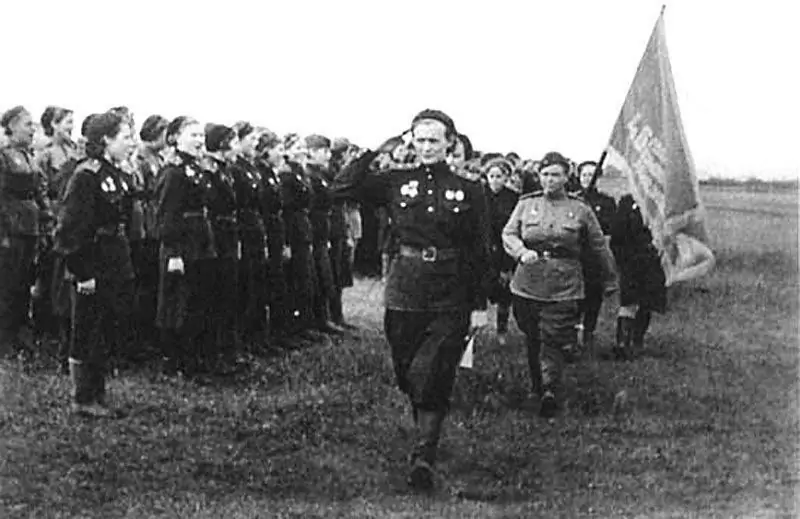
More than 1 million women fought on the fronts of the Great Patriotic War in the Soviet army. No less of them took part in partisan and underground resistance. They were between 15 and 30 years old. They mastered all military specialties - pilot, tank, submachine gun, sniper, machine gunner … Women not only saved, as it was before, working as nurses and doctors, but they also killed.
In the book, women talk about a war that men did not tell us about. We did not know such a war. Men talked about exploits, about the movement of fronts and military leaders, and women talked about something else - how terrible it is to kill for the first time … or go after the battle across the field where the dead are lying. They lie scattered like potatoes. They are all young, and I feel sorry for everyone - both the Germans and their Russian soldiers.
After the war, women had another war. They hid their military records, their wounds, because they had to learn to smile again, walk in high heels and get married. And the men forgot about their fighting friends, betrayed them. They stole the Victory from them. Not shared.
Svetlana Aleksandrovna Aleksievich
writer, journalist.
Memories of Veteran Women. Clippings from the book of Svetlana Aleksievich
We drove for many days … We went with the girls to some station with a bucket to get some water. They looked around and gasped: one by one the trains were going, and there were only girls. They were singing. They wave to us - some with kerchiefs, some with caps. It became clear: men not enough, they were killed, in the ground. Or in captivity. Now we are instead of them …
Mom wrote a prayer for me. I put it in a locket. Maybe it helped - I returned home. I kissed the medallion before the fight …"
Anna Nikolaevna Khrolovich, nurse
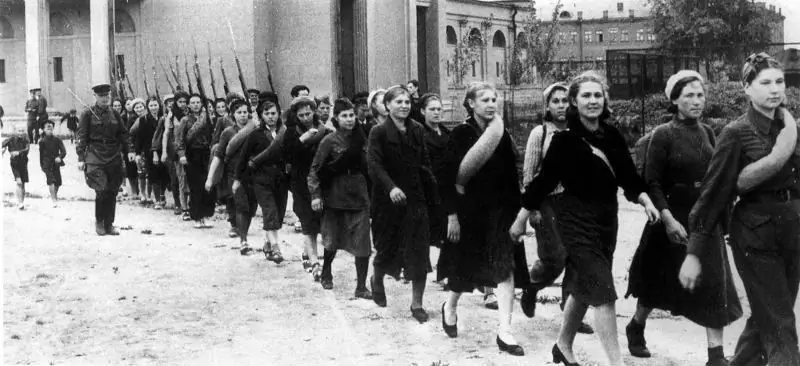
“To die … I was not afraid to die. Youth, probably, or something else … Death is around, death is always near, but I did not think about it. We didn't talk about her. She circled, circled somewhere close, but everything - by.
Once at night a whole company was conducting reconnaissance by force in the sector of our regiment. By dawn, she moved away, and a groan was heard from the no-man's land. Remained wounded.
“Don't go, they’ll kill me,” the soldiers didn’t let me in, “you see, it’s already dawn.”
Didn't obey, crawled. She found the wounded man, dragged him for eight hours, tying him by the hand with a belt.
Dragged a living one.
The commander found out, announced in the heat of the moment five days of arrest for unauthorized absence.
And the regiment's deputy commander reacted differently: "Deserves an award."
At the age of nineteen I had a medal "For Courage".
At nineteen, she turned gray. At the age of nineteen, in the last battle, both lungs were shot, the second bullet passed between two vertebrae. My legs were paralyzed … And they thought I was killed … At nineteen … I have a granddaughter like that now. I look at her - and I do not believe it. Baby!
When I came home from the front, my sister showed me the funeral … I was buried …"
Nadezhda Vasilievna Anisimova, medical instructor of a machine-gun company
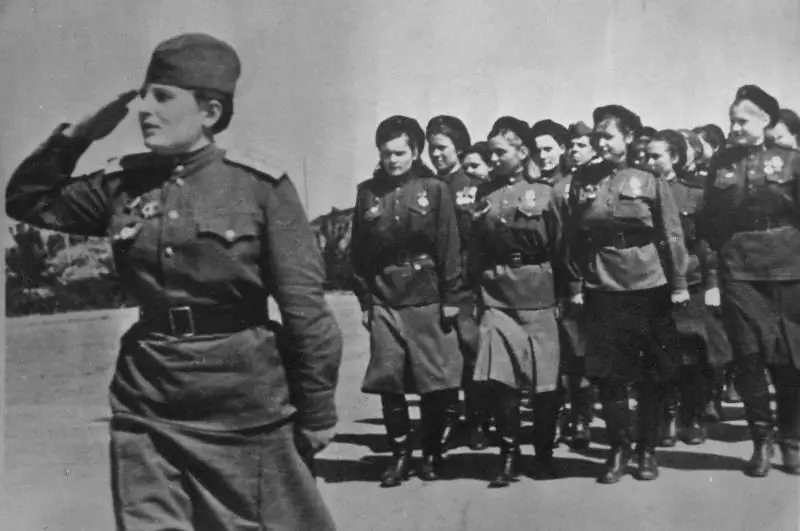
“At this time, a German officer was giving instructions to the soldiers. A cart approached, and the soldiers were passing some kind of cargo along a chain. This officer stood for a while, gave orders, then disappeared. I see that he has already shown himself twice, and if we clap again, that's all. Let's miss it. And when he appeared the third time, this one instant - it appears, then disappears - I decided to shoot. I made up my mind, and suddenly such a thought flashed through: this is a man, even though he is an enemy, but a man, and my hands somehow began to tremble, trembling and chills went all over my body. Some kind of fear … Sometimes in my dreams and now this feeling comes back to me … After the plywood targets, it was difficult to shoot at a living person. I can see it through the telescopic sight, I can see it well. As if he is close … And something inside me is resisting … Something doesn’t give, I can’t make up my mind. But I pulled myself together, pulled the trigger … He waved his hands and fell. Whether he was killed or not, I don't know. But after that I got even more trembling, some kind of fear appeared: I killed a man ?! The thought itself had to get used to. Yes … In short - horror! Not forget…
When we arrived, we began to tell our platoon what happened to me, held a meeting. We had a Komsomol organizer Klava Ivanova, she tried to convince me: "You should not feel sorry for them, but hate them." The Nazis killed her father. We used to get drunk, and she asks: "Girls, don't, let's defeat these bastards, then we'll sing."
And not right away … We did not succeed right away. It's not a woman's business to hate and kill. Not ours … I had to convince myself. Persuade…"
Maria Ivanovna Morozova (Ivanushkina), corporal, sniper
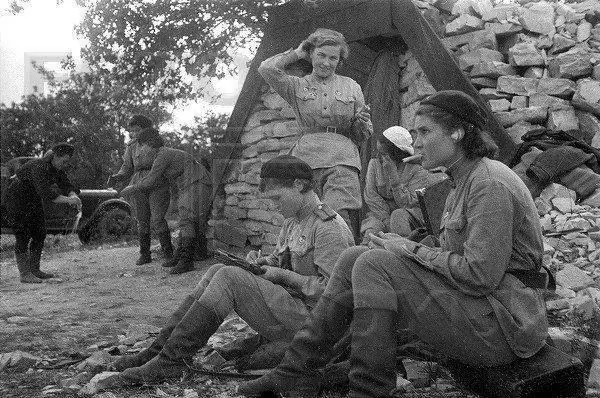
“Two hundred people were wounded once in a barn, and I was alone. The wounded were delivered directly from the battlefield, a lot. It was in some village … Well, I don't remember, so many years have passed … I remember that for four days I did not sleep, did not sit down, everyone shouted: "Sister! Sister! Help, dear!" I ran from one to the other, once stumbled and fell, and immediately fell asleep. I woke up from screaming, the commander, a young lieutenant, also wounded, raised himself on his healthy side and shouted: "Be quiet! Be silent, I order!" He realized that I was exhausted, but everyone was calling, it was painful for them: "Sister! Sister!" How I jumped up, how I ran - I don't know where, why. And then the first time I got to the front, I cried.
And so … You never know your heart. In winter, captured German soldiers were led past our unit. They walked frozen, with torn blankets on their heads and burnt overcoats. And the frost was such that the birds fell on the fly. The birds were freezing.
One soldier walked in this column … A boy … Tears froze on his face …
And I was driving bread in a wheelbarrow to the dining room. He can't take his eyes off this car, he can't see me, only this car. Bread … Bread …
I take and break off one loaf and give it to him.
He takes … He takes it and does not believe. Doesn't believe … Doesn't believe!
I was happy…
I was happy that I couldn't hate. I was surprised at myself then …"
Natalya Ivanovna Sergeeva, private, nurse
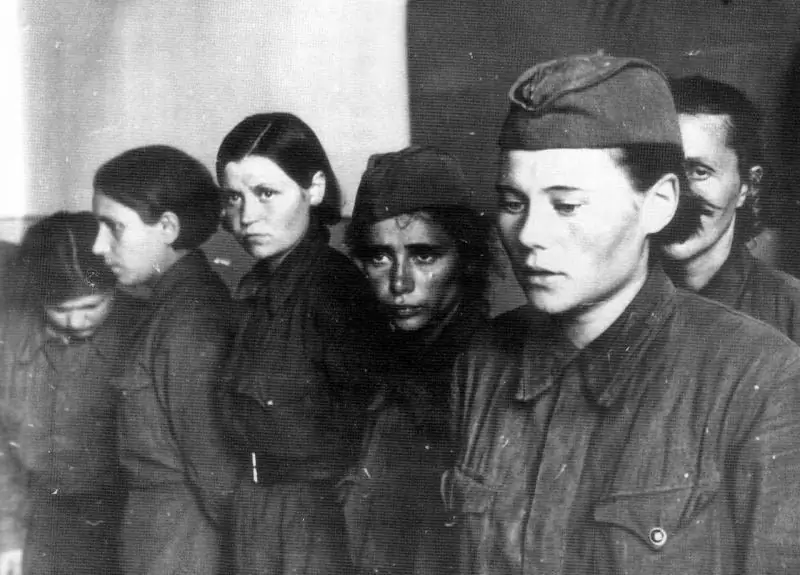
“On the thirtieth May of the forty-third year …
At exactly one o'clock in the afternoon there was a massive raid on Krasnodar. I rushed out of the building to see how the wounded were sent out of the railway station.
Two bombs hit the shed where the ammunition was stored. Before my eyes, the boxes flew higher than the six-story building and tore.
I was thrown by a hurricane wave against a brick wall. Lost consciousness …
When I regained consciousness, it was already evening. She raised her head, tried to squeeze her fingers - it seemed to move, barely ripped open her left eye and went to the department, covered in blood.
In the corridor I meet our older sister, she did not recognize me, she asked:
- "Who are you? Where are you from?"
She came closer, gasped and said:
- "Where have you been for so long, Ksenya? The wounded are hungry, but you are not."
They quickly bandaged my head, my left arm above the elbow, and I went to get dinner.
In the eyes darkened, sweat poured hail. She began to distribute dinner, fell. They brought me to consciousness, and only one can hear: "Hurry! Hurry!" And again - "Hurry! Faster!"
A few days later they took blood from me for the seriously wounded. People were dying … … During the war, I changed so much that when I came home, my mother did not recognize me."
Ksenia Sergeevna Osadcheva, private, hostess sister
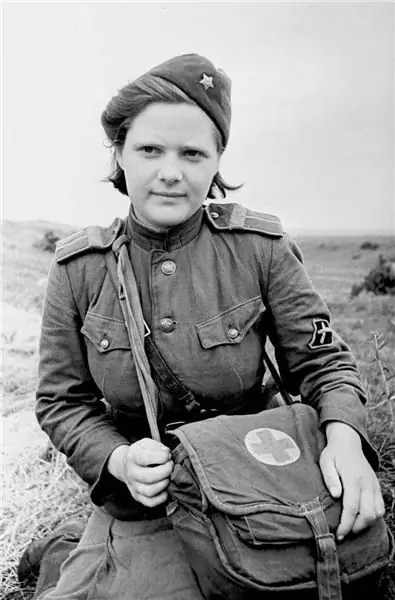
“The first guards division of the people's militia was formed, and we, several girls, were taken to the medical battalion.
I called my aunt:
- I'm leaving for the front.
On the other end of the wire, they answered me:
- March home! Dinner is already cold.
I hung up. Then I felt sorry for her, insanely sorry. The blockade of the city began, the terrible blockade of Leningrad, when the city was half extinct, and she was left alone. Old.
I remember they let me go on leave. Before going to my aunt, I went to the store. Before the war, she was terribly fond of candy. I say:
- Give me candy.
The saleswoman looks at me like I'm crazy. I didn’t understand: what is a card, what is a blockade? All the people in the line turned to me, and I have a bigger rifle than I do. When they were given to us, I looked and thought: "When will I grow up to this rifle?" And everyone suddenly began to ask, the whole queue:
- Give her candy. Cut out coupons from us.
And they gave me …
They treated me well in the medical battalion, but I wanted to be a scout. She said that I would run to the front line if they didn’t let me go. They wanted to expel from the Komsomol for this, for not obeying the military regulations. But I ran away anyway …
The first medal "For Courage" …
The battle began. Heavy fire. The soldiers lay down. Team: "Forward! For the Motherland!", And they are lying. Again the team, again they lie. I took off my hat so that they could see: the girl got up … And they all got up, and we went into battle …
They gave me a medal, and on the same day we went on a mission. And for the first time in my life it happened … Our … Feminine … I saw my blood, like a scream:
- I was wounded …
In the reconnaissance with us was a paramedic, already an elderly man.
He to me:
- Where did you get hurt?
- I do not know where … But the blood …
Like a father, he told me everything …
I went on reconnaissance after the war for about fifteen years. Every night. And my dreams are like this: either my machine gun refused, then we were surrounded. You wake up - your teeth grind. Remember - where are you? Is it there or here?
The war ended, I had three desires: first - finally I will not crawl on my stomach, but I will ride a trolleybus, second - to buy and eat a whole white loaf, third - to sleep in a white bed and so that the sheets crunch. White sheets …"
Albina Aleksandrovna Gantimurova, senior sergeant, intelligence officer
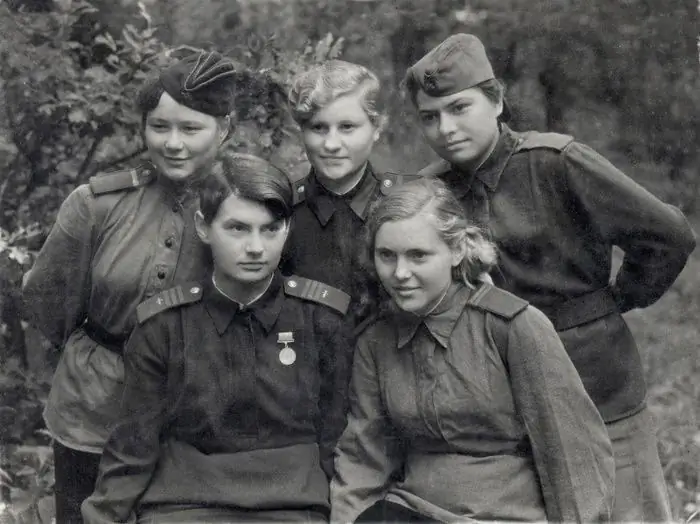
“I'm expecting my second child … My son is two years old and I'm pregnant. Here is a war. And my husband is at the front. I went to my parents and did … Well, you understand?
Abortion…
Although it was then forbidden … How to give birth? There are tears all around … War! How to give birth in the midst of death?
She graduated from the courses of ciphers, was sent to the front. I wanted to avenge my baby, for not giving birth to him. My girl … A girl should have been born …
I asked to go to the front line. Left at the headquarters …"
Lyubov Arkadyevna Charnaya, junior lieutenant, cipher officer
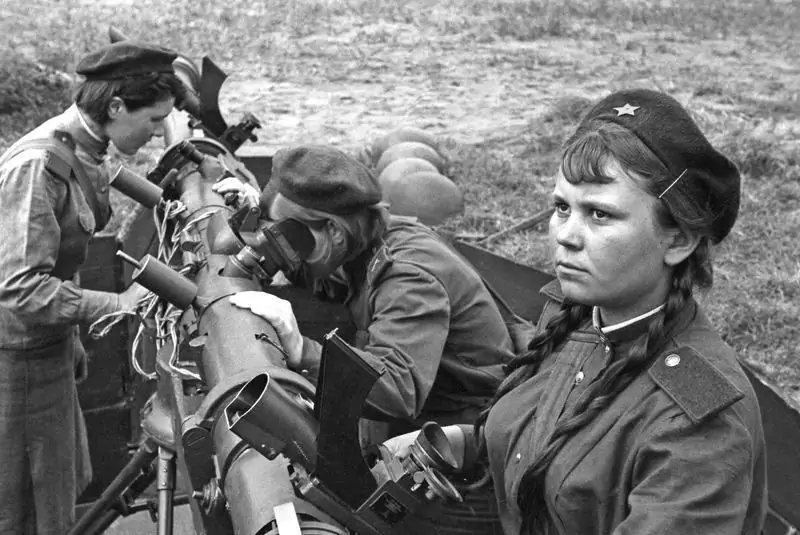
“There was no way to attack us: - they gave us a new one, and after a couple of days it was covered in blood.
My first wounded was Senior Lieutenant Belov, my last wounded was Sergei Petrovich Trofimov, sergeant of a mortar platoon. In the seventieth year, he came to visit me, and I showed my daughters his wounded head, which still has a large scar.
In total, I took out four hundred and eighty-one wounded from under the fire.
Some of the journalists calculated: a whole rifle battalion …
They carried men, two or three times heavier than us. And the wounded are even heavier. You drag him and his weapons, and he is also wearing an overcoat and boots.
Take on eighty kilograms and drag.
Reset …
You go for the next one, and again seventy-eighty kilograms …
And so five or six times in one attack.
And in you yourself forty-eight kilograms - ballet weight.
Now I can't believe it … I can't believe it myself …"
Maria Petrovna Smirnova (Kukharskaya), medical instructor
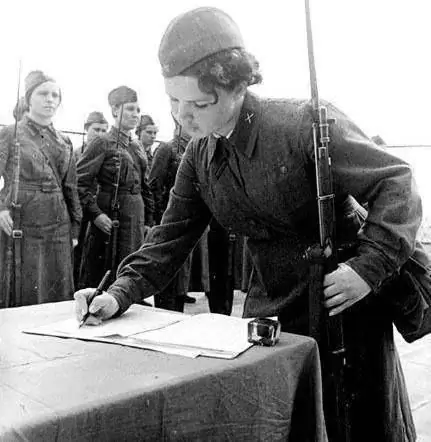
“Forty-second year …
We go on a mission. We crossed the front line, stopped at a cemetery.
The Germans, we knew, were five kilometers from us. It was night, they were throwing flares all the time.
Parachute.
These rockets burn for a long time and illuminate the whole area far away.
The platoon commander took me to the edge of the cemetery, showed me where the missiles were being thrown from, where the bushes were, from which the Germans might emerge.
I am not afraid of the dead, since childhood I was not afraid of the cemetery, but I was twenty-two years old, for the first time I was on duty …
And in these two hours I turned gray …
The first gray hair, a whole strip, I found in myself in the morning.
I stood and looked at this bush, it rustled, moved, it seemed to me that the Germans were coming from there …
And someone else … Some monsters … And I am alone …
Is it a woman's business to stand guard at a cemetery at night?
The men treated everything easier, they were already ready for the idea that they had to stand at the post, they had to shoot …
But for us it was still a surprise.
Or make a transition of thirty kilometers.
With combat layout.
In the heat.
The horses were falling …"
Vera Safronovna Davydova, private infantryman
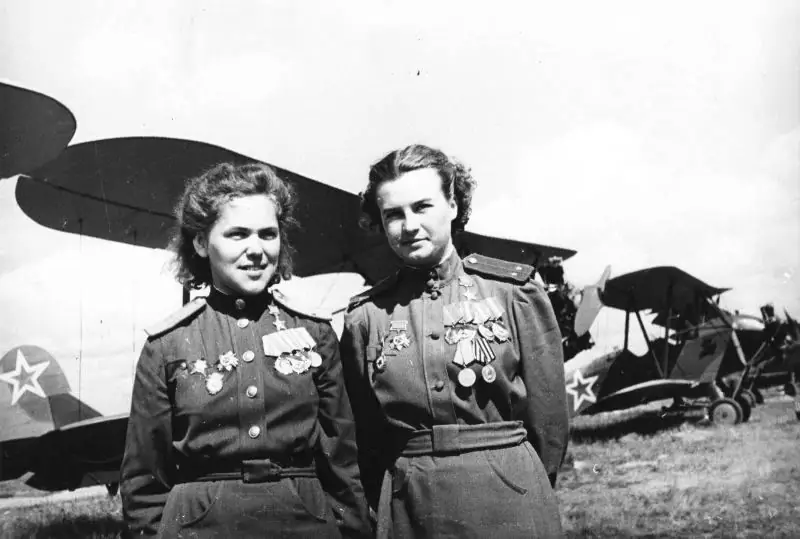
“Melee attacks …
What do I remember? I remembered the crunch …
Hand-to-hand combat begins: and immediately this crunch - cartilage breaks, human bones crack.
Animal screams …
When the attack, I walk with the fighters, well, a little behind, count - next.
Everything before my eyes …
Men stab each other. Finish off. They break up. They beat him with a bayonet in the mouth, in the eye … in the heart, in the stomach …
And this … How to describe? I am weak … Weak to describe …
In a word, women do not know such men, they do not see them like that at home. Neither women nor children. It is generally terribly done …
After the war, she returned home to Tula. She screamed all the time at night. At night, my mother and sister sat with me …
I woke up from my own scream …"
Nina Vladimirovna Kovelenova, senior sergeant, medical instructor of a rifle company
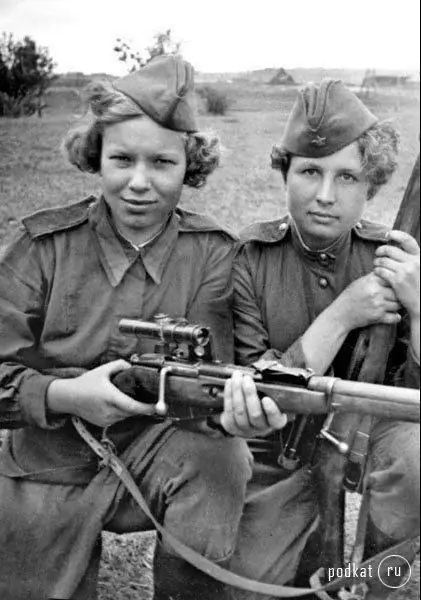
“A doctor came, did a cardiogram, and they ask me:
- When did you have a heart attack?
- What heart attack?
- Your whole heart is scarred.
And these scars, apparently, from the war. You go over the target, you are shaking all over. The whole body shivers, because there is fire below: fighters are shooting, anti-aircraft guns are shooting … Several girls were forced to leave the regiment, could not stand it. We flew mostly at night. For a while they tried to send us on assignments during the day, but they immediately abandoned this idea. Our Po-2s were shot from a machine gun …
We made up to twelve flights a night. I saw the famous ace pilot Pokryshkin when he flew in from a combat flight. He was a strong man, not twenty years old or twenty-three, like us: while the plane was refueled, the technician managed to take off his shirt and unscrew it. It flowed from her, as if he had been in the rain. Now you can easily imagine what happened to us. You arrive and you can't even get out of the cockpit, they pulled us out. They could no longer carry the tablet, they pulled it along the ground.
And the work of our girls-gunsmiths!
They had to hang four bombs - that's four hundred kilograms - by hand from the car. And so all night - one plane took off, the second - sat down.
The body was rebuilt to such an extent that we were not women throughout the war. We have no women's affairs … Monthly … Well, you yourself understand …
And after the war, not everyone was able to give birth.
We all smoked.
And I smoked, it feels like you're calming down a little. When you arrive, you tremble all over, light a cigarette and calm down.
We wore leather jackets, trousers, a tunic, and a fur jacket in winter.
Involuntarily, something masculine appeared both in the gait and in the movements.
When the war ended, khaki dresses were made for us. We suddenly felt that we were girls …"
Alexandra Semyonovna Popova, guard lieutenant, navigator
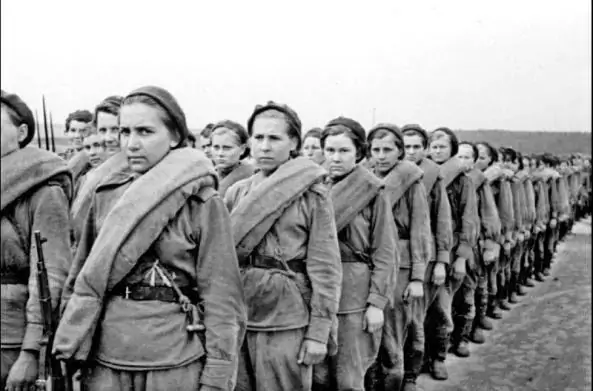
“We arrived at Stalingrad …
There were mortal battles. The most deadly place … The water and the earth were red … And from one bank of the Volga we need to cross to the other.
Nobody wants to listen to us:
"What? Girls? Who the hell needs you here! We need riflemen and machine gunners, not signalmen."
And there are a lot of us, eighty people. By the evening, the girls who were bigger were taken, but we alone with one girl are not taken.
Small in stature. Have not grown.
They wanted to leave it in reserve, but I raised such a roar …
In the first battle, the officers pushed me off the parapet, I put my head out so that I could see everything myself. There was some kind of curiosity, childish curiosity …
Naive!
The commander yells:
- "Private Semyonova! Private Semyonova, you're out of your mind! Such a mother … Kill!"
I could not understand this: how could it kill me if I had just arrived at the front?
I didn’t know yet what death is ordinary and unintelligible.
You cannot ask her, you cannot persuade her.
They brought up the people's militia in old lorries.
Old men and boys.
They were given two grenades each and sent into battle without a rifle, the rifle had to be obtained in battle.
After the battle, there was no one to bandage …
All killed …"
Nina Alekseevna Semenova, private, signalman
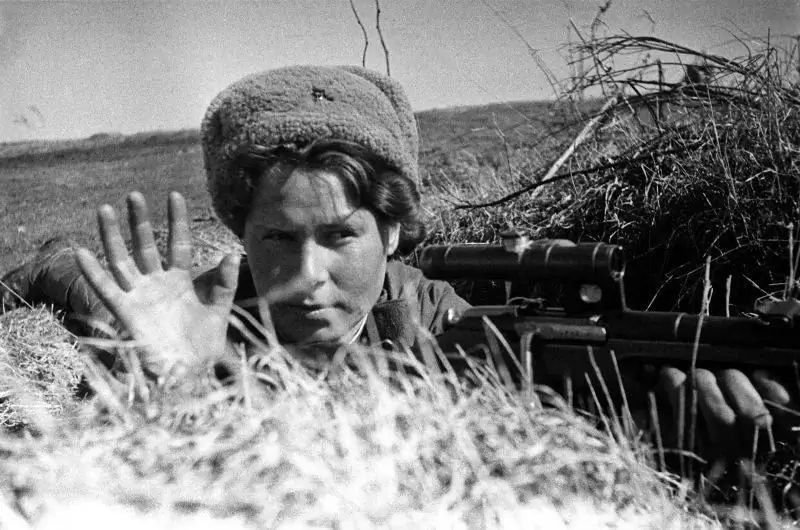
“Before the war, there were rumors that Hitler was preparing to attack the Soviet Union, but these conversations were strictly suppressed. Suppressed by the relevant authorities …
Is it clear to you what these organs are? NKVD … Chekists …
If people whispered, then at home, in the kitchen, and in communal apartments - only in their room, behind closed doors or in the bathroom, having opened the tap with water before that.
But when Stalin spoke …
He turned to us:
- "Brothers and sisters…"
Then everyone forgot their grievances …
Our uncle was in the camp, my mother's brother, he was a railway worker, an old communist. He was arrested at work …
It is clear to you - who? NKVD …
Our beloved uncle, and we knew that he was innocent.
They believed.
He has had awards since the Civil War …
But after Stalin's speech, my mother said:
- "Let's defend the Motherland, and then we'll figure it out."
Everyone loved their homeland. I ran straight to the recruiting office. I ran with a sore throat, my temperature has not completely slept yet. But I couldn't wait …"
Elena Antonovna Kudina, private, driver
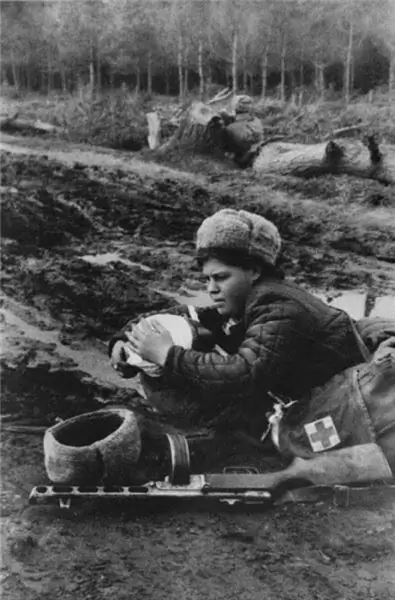
“From the first days of the war, reorganizations began in our flying club: men were taken away, and we, women, replaced them.
Taught the cadets.
There was a lot of work, from morning to night.
My husband was one of the first to go to the front. All I have left is a photograph: we are alone with him at the plane, in pilots' helmets …
We now lived together with my daughter, we lived all the time in the camps.
How did you live? I will close it in the morning, give it some porridge, and from four in the morning we are already flying. I return in the evening, and she will eat or not eat, all smeared with this porridge. No longer even crying, but only looking at me. Her eyes are big, like her husband's …
By the end of 1941, a funeral was sent to me: my husband died near Moscow. He was the flight commander.
I loved my daughter, but I took her to his family.
And she began to ask for the front …
On the last night …
I stood on my knees by the crib all night …"
Antonina G. Bondareva, guard lieutenant, senior pilot
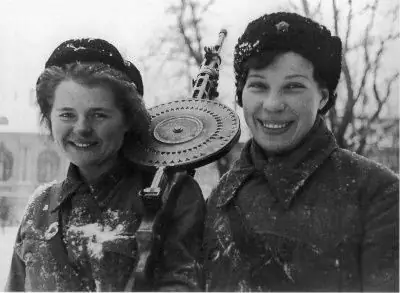
“I had a little baby, at three months I already took him on an assignment.
The commissar sent me off, and he himself cried …
She brought medicines from the city, bandages, serum …
Between the handles and between the legs I will put them, I will bandage them with diapers and carry them. In the forest, the wounded die.
Need to go.
Necessary!
No one else could pass, could not get through, everywhere there were German and police posts, I was alone.
With a baby.
He's in my diapers …
Now it's scary to confess … Oh, it's hard!
To keep the temperature, the baby cried, rubbed him with salt. He is then all red, the rash will go over him, he screams, crawls out of his skin. Will stop at the post:
- "Typhus, pan … Typhus …"
They drive to leave as soon as possible:
- "Vek! Vek!"
And rubbed with salt, and put the garlic. And the little child, I was still breastfeeding him. As we pass the posts, I will enter the forest, cry, cry. I'm screaming! So sorry for the child.
And in a day or two I go again …"
Maria Timofeevna Savitskaya-Radyukevich, partisan liaison
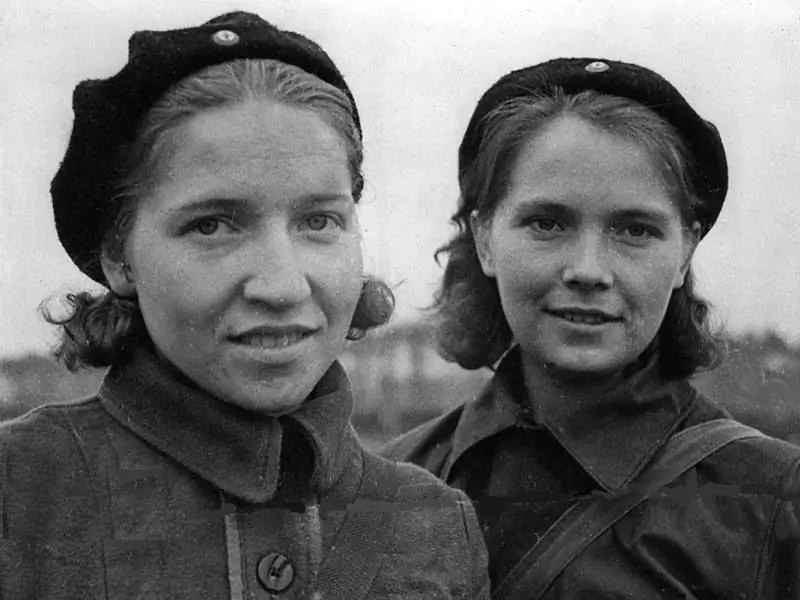
“They sent me to the Ryazan Infantry School.
They were released from there by the commanders of the machine-gun squads. The machine gun is heavy, you drag it on yourself. Like a horse. Night. You stand at the post and catch every sound. Like a lynx. You watch every rustle …
In war, as they say, you are half human and half beast. This is true…
There is no other way to survive. If you are only human, you will not survive. The head will blow away! In a war, you need to remember something about yourself. Something like that … Remember something from when a person was still not quite a person … I'm not a very scientist, a simple accountant, but I know that.
I reached Warsaw …
And all on foot, the infantry, as they say, the proletariat of war. They crawled on their belly … Don't ask me anymore … I don't like books about the war. About the heroes … We walked sick, coughing, not sleeping enough, dirty, poorly dressed. Often hungry …
But we won!"
Lyubov Ivanovna Lyubchik, submachine gunner platoon commander
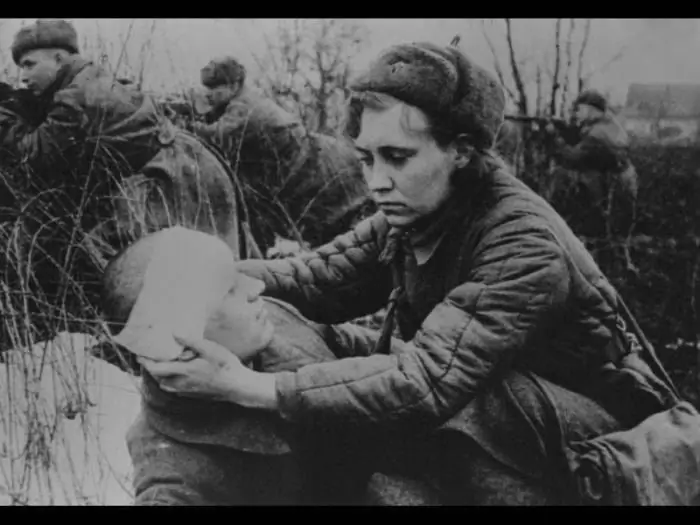
“Once on the teachings …
For some reason I cannot remember it without tears …
It was spring. We shot back and walked back. And I picked some violets. Such a small bunch. Narwhal and tied him to the bayonet. So I go. We returned to the camp. The commander has lined up everyone and calls me.
I'm out…
And I forgot that I had violets on my rifle. And he began to scold me:
- "The soldier should be a soldier, not a flower picker."
He did not understand how it was possible to think about flowers in such an environment. The man did not understand …
But I didn't throw away the violets. I quietly took them off and put them in my pocket. For these violets they gave me three outfits out of turn …
Another time I stand at the post.
At two o'clock in the morning they came to replace me, but I refused. I sent my shift to sleep:
- "You will stand during the day, and I will now."
I agreed to stand all night, until dawn, just to listen to the birds. Only at night did something resemble the old life.
Peaceful.
When we went to the front, walked along the street, people stood in a wall: women, old people, children. And everyone cried: "The girls are going to the front." A whole battalion of girls marched on us.
I'm driving…
We collect the killed after the battle, they are scattered across the field. All are young. Boys. And suddenly - the girl lies.
The murdered girl …
Then everyone stops talking …"
Tamara Illarionovna Davidovich, sergeant, driver
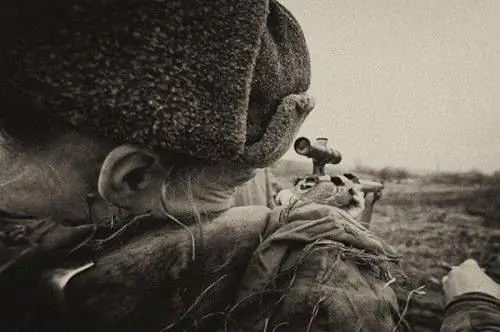
“Dresses, high heels …
How sorry we are for them, they hid them in bags. In the daytime in boots, and in the evening at least a little in shoes in front of the mirror.
Raskova saw - and a few days later the order: to send all women's clothes home in parcels.
Like this!
But we studied the new plane in six months instead of two years, as it should be in peacetime.
In the first days of training, two crews died. They put up four coffins. All three regiments, we all wept bitterly.
Raskova spoke:
- Friends, dry your tears. These are our first losses. There will be a lot of them. Make a fist …
Then, in the war, they were buried without tears. They stopped crying.
We flew fighters. The height itself was a terrible burden for the entire female body, sometimes the stomach pressed right into the spine.
And our girls flew and shot down aces, and even what aces!
Like this!
You know, when we walked, the men looked at us with surprise: the pilots were coming.
They admired us …"
Claudia Ivanovna Terekhova, aviation captain
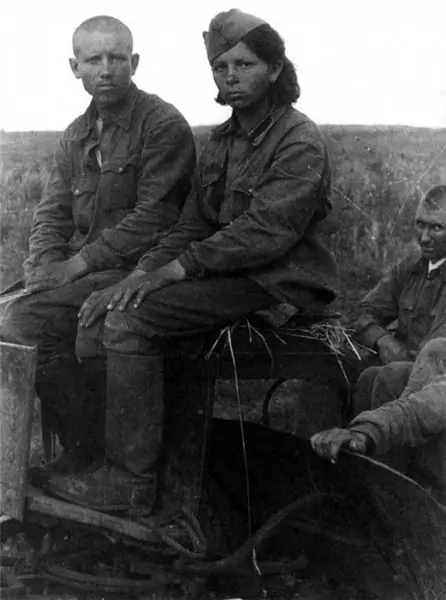
“Someone betrayed us …
The Germans found out where the partisan detachment was stationed. They cordoned off the forest and approaches to it from all sides.
We hid in wild thickets, we were saved by swamps, where the punishers did not go.
Bog.
And the technique, and people, she tightened tightly. For several days, for weeks, we stood up to our throats in water.
We had a radio operator with us, she recently gave birth.
The child is hungry … Asks for breast …
But the mother herself is hungry, there is no milk, and the baby is crying.
Punishers nearby …
With dogs …
If the dogs hear, we will all die. The whole group - about thirty people …
Do you understand?
The commander makes a decision …
No one dares to give the order to the mother, but she herself guesses.
He lowers the bundle with the child into the water and holds it there for a long time …
The child no longer screams …
Nizvuka …
And we cannot raise our eyes. Neither mother, nor each other …"
From a conversation with a historian.
- When did women first appear in the army?
- Already in the IV century BC, women fought in the Greek armies in Athens and Sparta. Later they took part in the campaigns of Alexander the Great.
Russian historian Nikolai Karamzin wrote about our ancestors: “The Slavs sometimes went to war with their fathers and spouses, without fear of death: so during the siege of Constantinople in 626, the Greeks found many female corpses between the Slavs killed. Mother, raising children, prepared them to be warriors."
- And in modern times?
- For the first time - in England in 1560-1650, hospitals began to form, in which women soldiers served.
- What happened in the 20th century?
- The beginning of the century … In the First World War in England, women were already taken into the Royal Air Force, the Royal Auxiliary Corps and the Women's Legion of Motor Transport were formed - in the amount of 100 thousand people.
In Russia, Germany, France, many women also began to serve in military hospitals and hospital trains.
And during World War II, the world witnessed a female phenomenon. Women have served in all branches of the military already in many countries of the world: in the British army - 225 thousand, in the American - 450-500 thousand, in the German - 500 thousand …
About a million women fought in the Soviet army. They have mastered all military specialties, including the most "male" ones. Even a language problem arose: the words "tanker", "infantryman", "submachine gun" did not have a feminine gender until that time, because this work had never been done by a woman. Women's words were born there, in the war …






